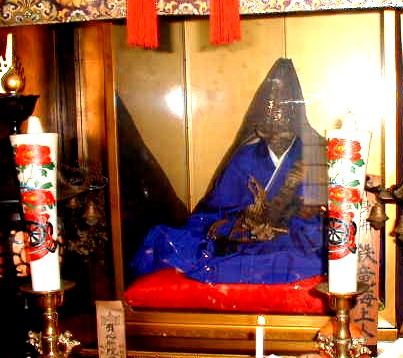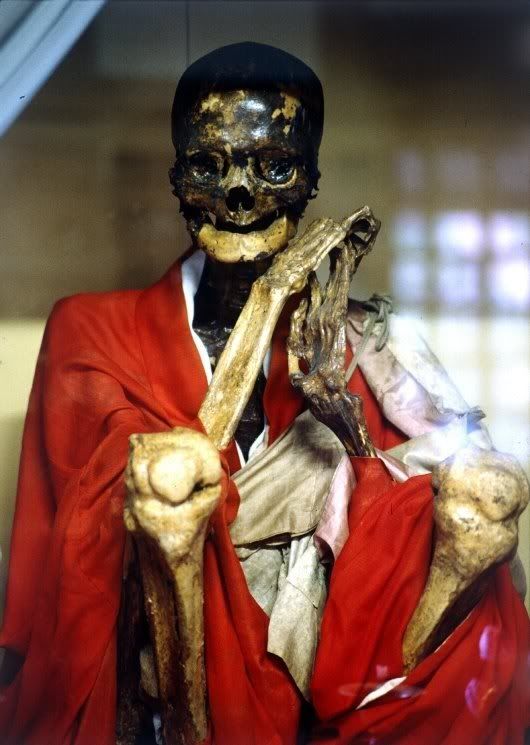
Sokushinbutsu is the long and extremely painful process of self-mummification. It involved a 1,000 days of a diet of nuts accompanied by intense meditation, often in freezing mountain streams. This was followed by another 1,000 days of a more restricted diet, a tea similar to lacquer, and more meditation. Finally, the monk sat to meditate in the lotus position and was sealed in a prayer room. After 1,000 days the room would be opened to see if he become mummified. The specifics of the Sokushinbutsu ritual can be found here.
While it is thought that hundreds of monks attempted Sokushinbutsu, only 24 mummies have been found, so it appears the success rate was rather low. But, as the name implies, those who were successful were regarded as having reached Nirvana and were venerated. Also, as buddahs they would be able to reenter the world in a different carnation.
Sokushinbutsu was seen as the culmination of a life of prayer and devotion. It was also believed to benefit the local population. The monk who achieved Sokushinbutsu brought blessings to the people; his mummification was a gift of kindness and compassion that could bring a good harvest or freedom from disease. Lowe described the ritual transformation as the most "appropriate sign to show true belief than leaving one’s temporary abode on this earth in exchange for eternal salvation and the possibility of becoming one with the beloved Buddha."
While I realize this is awesome, especially the week of Halloween, and that these monks showed great self control and dedication, I invited you to think about the price they were willing to pay to have communion with the divine.
For more information:
This book is a good source of more information and has lovely pictures of the mountains.
This one gives good scientific and archaeological information.
This article focuses on the physiological processes


I just watched last week a movie called 17 miracles, which was about the Mormon pioneers in the Martin and Willey Handcart companies. It is amazing to me how devoted these people were. Many actually were so dedicated that they gave their lives for their religion and their God.
ReplyDeleteIt's a really tough question, Alicia, that you pose. Would I really be willing to give up everything, even my own life if necessary, to my God? I think it is a really tough thing. I don't think that I would be able to mummify myself. Mostly because my culture has not taught me that that is something valuable (to me it's pretty creepy even though I realize it must not have been creepy to them). But I do think that, given the right conditions, I might be able to give up everything for something that I know is right. At least I hope that I would have that caliber of character to be able to. We really can't know where our limits are until we are pushed to them.
I think it was likely rather odd to other Buddhist sects, much like how we view flagellation. By in large the culture probably agreed with the general concepts of self denial and seeking Nirvana, but they did not all ascribe to the view that this was the best way to achieve those goals.
ReplyDeleteI agree that we all aspire to greatness and to demonstrating our integrity by staying strong in what we believe. This situation reminds me of the phrase "eye single to the glory of God" (D+C 4) That when you are so focused on one thing everything else just melts away, in this case quite literaly.
i really like this concept of not TRULY knowing what you are capable of doing until you are put into that specific situation. We cannot say I would do this or I would do that, we just don't know. It is also interesting to me all of the cultural bias and influence we receive that affects our everyday and even long term decision making process. For example I like peanut butter and root beer, is that really my taste buds or am I just falling prey to American culture from the get go with my mom feeding me peanut butter (i wasn't allowed to have root beer as a small child so i don't know how that one got in there....) Just interesting to me how much of a role culture plays in shaping an individual....
ReplyDeleteI agree that one's culture affects what they view to be normal or acceptable, especially in regards to dying for one's beliefs. I know that in America, we are taught to defend our beliefs. For example, when terrorists attack we are willing to defend our country and our God. Those who die in the process are remembered and honored. But I also know that in the Middle East, many people are sent on suicide missions because it is considered their duty that they owe to their God. So to me it's just interesting the differences between defending one's religious beliefs so that others may have the opportunity to live out their beliefs, while others think that the only way to live out their religious beliefs is to die.
ReplyDeleteOh my goodness!! This is so crazy! They mummified themselves! How in the world... I don't think I could do that, actually, probably not at all. Possibly kill myself if that was required by my religion, but in that manner? I don't think so. I think things like this are probably why the mystic and occult have such a bad connotation, because they involve such painful or self-denying rituals to achieve that higher spiritual state. I like your comparison to flagellation though, within Christian monks, and that makes more sense. And it is interesting to hear how the community around the self-mummifying monk reacts, with praise and honor and gratitude for his sacrifice. But the whole purpose wasn't really for the greater good, it was more for that individual's spiritual progression. I have less hesitation to the idea of dying or even something so horrific as self-mummification if I knew that it would preserve or bless someone self substantially, such as my children or family. Interesting how that works.
ReplyDeletewell at least they weren't mummifying other people right? I think there is a difference between mummifying yourself to reach Nirvana and occult human sacrifice.
ReplyDeleteBut I'm glad you guys liked the post. Thought it was really fascinating.
A thought that came to me as I was reading your comments was how does the mandated differ from the recommended? Like we are mandated to go to church but it is recommended to help set up the chairs and participate. Christians call it going the extra mile. The Buddhists were mandated to seek harmony not to mummify themselves. How does that affect our opinions of their actions?